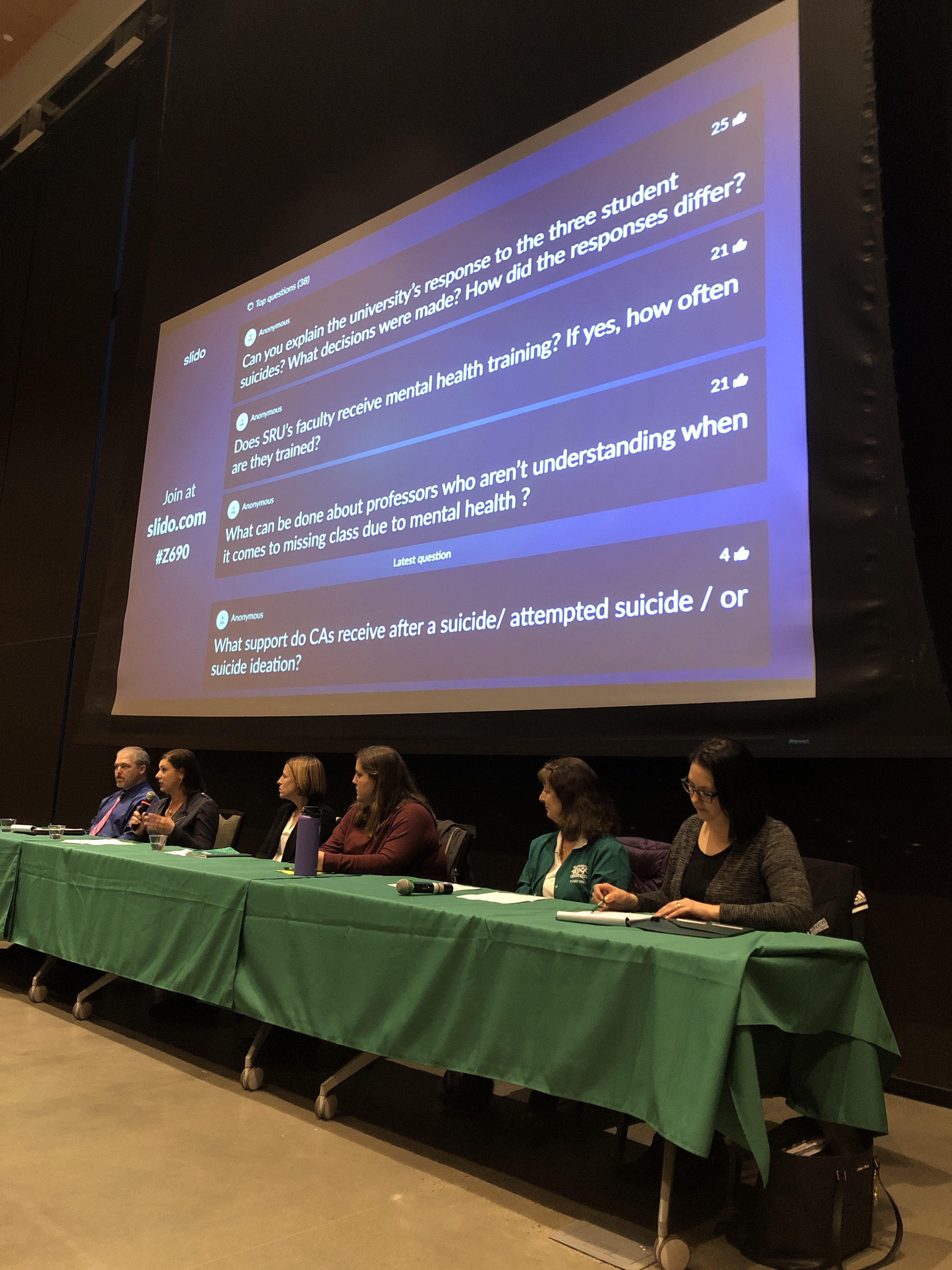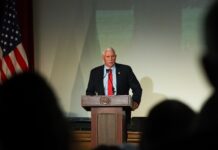Disclaimer: This staff editorial contains mentions of death and suicide and may be triggering to some readers. Please use caution before reading.
To submit a care report for yourself or someone you are concerned about, click here.
If you or someone you know needs help, local help is available through campus police (724-738-3333), the counseling center (724-738-2034) and student support (724-738-2121). Other resources include the National Suicide Prevention Lifeline (1-800-273-TALK) and the Crisis Text Line (text “HOME” to 741741).
The Slippery Rock Student Government Association (SGA) hosted its second town hall this semester with a focus on mental health.
The town hall featured six panelists: Jennifer Philips (assistant director of Buildings A and D), Janet Flecker (nurse practitioner at Student Health Services), Ken Messina (clinical director of the counseling center), Jayne Hale (co-chair of President’s Commission on Mental Health), Stacy Arend (athletic trainer for baseball and men’s soccer) and Kim Coffaro (assistant director of the Office of Disability Services).
During introductions, Coffaro stated that 30% of students are registered with the Office of Disability Services with a mental health related diagnosis. In a given semester, between 500 and 600 students are registered with the Office of Disability Services for any type of diagnosis.
Flecker added that the health center had 470 visits related to mental health so far this semester.
About 130 students, professors and administrators were in attendance. Within 30 minutes of the town hall, the audience submitted 31 anonymous questions; by the end of the night, over 60 anonymous questions were submitted.
The first audience question asked how the university responded to the deaths of three SRU students by suicide within the past year. David Wilmes, chief students affairs officers, was not on the panel, but spoke about his insight on being part of those conversations.
In all three situations, Wilmes, SRU President William Behre and representatives from residence life and/or student support were present. Wilmes said that the group contacted each student’s close friends, faculty who taught each student and residence hall neighbors for two of the students.
Wilmes specifically mentioned how the university chose to not use the word “suicide” in the emails that notified university stakeholders.
“I will also tell you because I’m a very transparent person that we had a conversation about, ‘Do we say that these are suicides?’, not because we were afraid that that was going to cause something on campus, but because the families had just found out literally hours before,” Wilmes said. “We have to think about the fact that these individuals had families, had parents.”
With Messina just joining SRU in August, preparing for his move to Pennsylvania during the same time as one of the student deaths, many of his responses to questions mentioned plans to come with the counseling center.
“Like I tell everybody, I’m the new director of the counseling center because obviously things weren’t going great last year, or else I wouldn’t have this job,” Messina said.
For one of his goals, he emphasized outreach into the community. So far, the counseling center has made appearances at events on campus, such as the Mental Health Awareness Fair. Messina himself also attended a training session for community assistants in case anyone wanted to talk during or after the training.
Changes in counseling center hours may also occur in the future. One audience member said that she believes more hours in the evenings may be more convenient for students.
“I personally can’t go to my morning class, go to an hour of therapy and unpack emotional trauma, then go to my afternoon class and still be productive,” she said.
A large portion of the discussion also involved athletes, who may not be able to go to the counseling center due to their practice and class schedules. In her role as an athletic trainer, Arend said that athletics needs to address two groups about mental health: both student athletes and their coaches.
“I will say our student athletes are amazing at opening up about mental health and talking about it,” Arend said. “Our coaches, on the other side, are a little different because they’re just an older generation, so we are trying to have those conversations in our coaches meetings. We met in May in regards to starting that conversation.”
During the panel, Wilmes also revealed that faculty weren’t required to attend mental health first aid trainings.
“There are opportunities, so they would need to take advantage of those,” Wilmes said.
Messina added that he wanted to include brief training at new faculty orientations.
“A big part of the process to start introducing faculty to mental health would be to get them early when they’re here so we can maybe start changing how faculty view mental health,” Messina said.
SGA will post the responses to the unanswered questions from the town hall onto its CORE page within the next two weeks. SGA will also look to host more town halls in the spring semester based off of feedback from this town hall.








